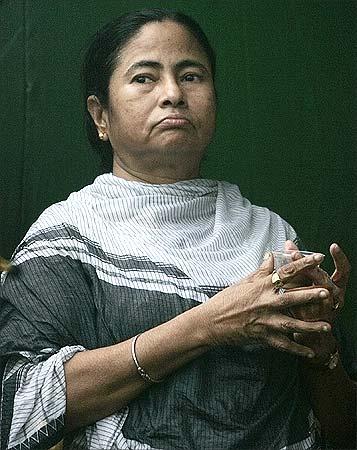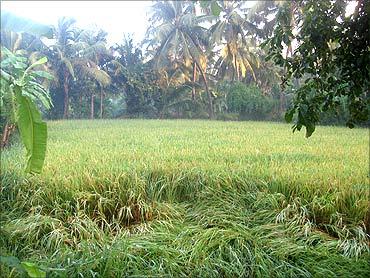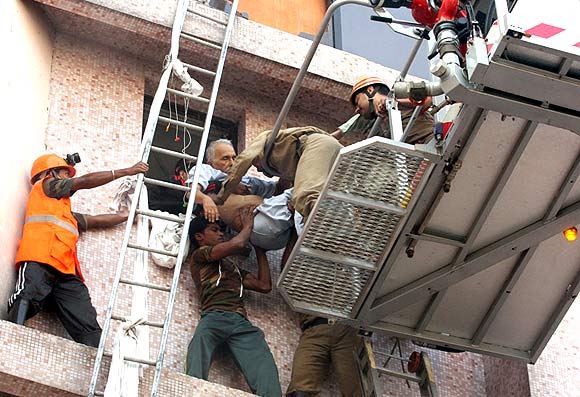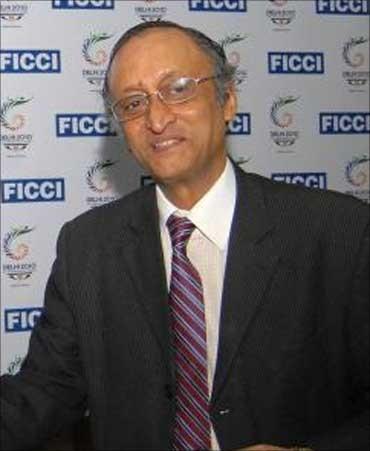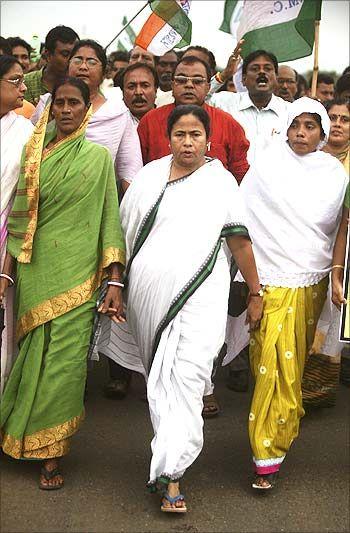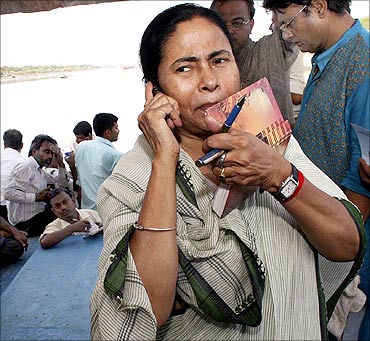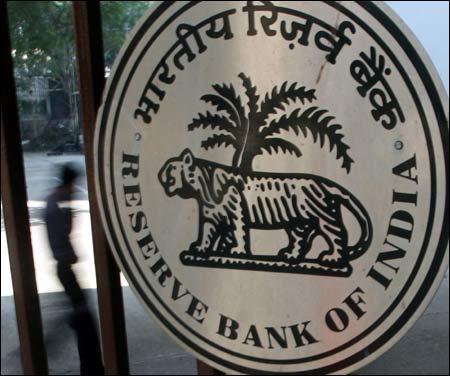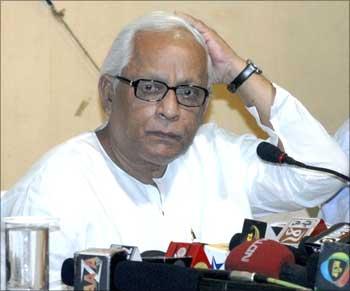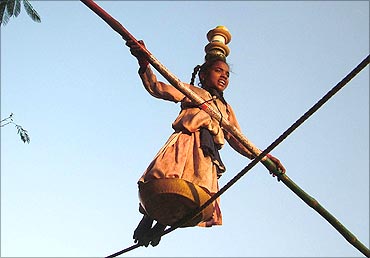 | « Back to article | Print this article |
Mamata's promises of resurgence stare at Bengal's economy
Immediately after donning the role of West Bengal chief minister, Mamata Banerjee had aired a voice of positivity.
'(Bharatiya Janata Pasrty-ruled) Gujarat is Gujarat (as an industrially advanced state) and Bengal is Bengal; we will evolve in our own way to usher in resurgence," she had said.
Now, after seven months in office, the promise of a resurgent Bengal appears to be more of a mirage.
Forget fresh investments, even existing projects are yet to take off, thanks to the land policy of the new Trinamool Congress government.
Click NEXT to read further. . .
Mamata's promises of resurgence stare at Bengal's economy
In fact, recently, a team from Larsen & Toubro met the chief minister, only to say that they would set up a power plant in her state if they got land, water and coal linkages.
That has been pretty much the entire investor community's demand -- but, that is something that is not quite in sync with Banerjee's policies.
Her government plans to steer clear from acquiring land for industrial projects, and that includes public-sector units.
A core committee comprising industry representatives, supposed to meet once a fortnight to resolve issues confronting the industry, are becoming more and more infrequent. Reason: issues remain the same and there is no hope of a resolution.
Click NEXT to read further. . .
Mamata's promises of resurgence stare at Bengal's economy
The lone industrialist who has been frequenting West Bengal over the last few months is Purnendu Chatterjee, chairman of The Chatterjee Group.
But, it seems that peace talks have now given way to a possible conflict, as the two stakeholders hold divergent views over Haldia Petrochemicals.
Banerjee has had to face other problems, too.
Her seven months in office were marked by twin disasters: the December 9 AMRI inferno killing 91 people in the state capital and 175-odd deaths from illicit liquor in South 24 Parganas district.
But, perhaps the root of a bigger catastrophe is waiting in the wings.
Click NEXT to read further. . .
Mamata's promises of resurgence stare at Bengal's economy
The flagging state finances has left the chief minister with more reasons to fret than celebrate in the new year.
At the core of the problems facing West Bengal, is a deteriorating financial situation. Most government departments have pinned the reason of their non-performance on inadequate funds.
A reality check
The chief minister is not the lone focus when it comes to people's perception of the government's laxity.
"Please do not ask any questions. The minister is deaf and dumb," is how Amit Mitra, holding the finance portflio, replied to the press recently, when asked about the sudden stoppage in pension for more than 6,000 retired employees of the Calcutta State Transport Corporation.
Click NEXT to read further. . .
Mamata's promises of resurgence stare at Bengal's economy
It contrasts the air of fanfare with which Mitra was inducted into the new government.
Restrained by the newly-imposed fiscal responsibility and Budget Management Act, it is likely that the state would not be able to meet some of its committed expenditure by March, if the Centre does not enhance its borrowing limit.
The poor financial condition of West Bengal can be assessed from the state's reliance on instruments such as ways and means advances, and overdraft from the RBI to meet short-term mismatch in cash flows.
In December, for the first time in seven months, the state faced an overdraft situation, according to sources.
At the same time, the borrowing limit of the state is fast depleting. Mitra refused to comment on the issue.
Click NEXT to read further. . .
Mamata's promises of resurgence stare at Bengal's economy
Consider the numbers: Last Monday, the state government borrowed Rs 1,300 crore (Rs 13 billion) from the market, after having borrowed Rs 1000 crore (Rs 10 billion) just a month ago.
With this, the total borrowing of the state in the present fiscal stands at close to Rs 18,723 crore (Rs 187.23 billion).
The original borrowing limit of the state was Rs 17,828 crore (Rs 178.28 billion), but the Centre enhanced it by Rs 2,706 crore (Rs 27.06 billion) in view of the dire state of finances.
With the enhanced borrowing limit of Rs 20,534 crore (Rs 205.34 billion), the state is left to borrow Rs 1,811 crore (Rs 18.11 billion) for the rest three months.
Click NEXT to read further. . .
Mamata's promises of resurgence stare at Bengal's economy
"The present borrowing limit," says a source close to development, "will make it difficult for the state government to meet its committed expenditure by March without any special package."
In a situation where the state has no room to borrow, reliance on W&M and overdrafts could lead the state to a crisis situation.
In 2010-11, the earlier Left Front government had resorted to overdraft seven times.
"Overdraft and W&M are ways of raising loans," notes Abhirup Sarkar, economist, Indian Statistical Institute.
"However, if the means of repayment is another loan, it is a crisis. I don't know if the present government has increased its sources of income to support this."
Click NEXT to read further. . .
Mamata's promises of resurgence stare at Bengal's economy
Ways and means advances is a mechanism the Reserve Bank of India uses under its credit policy, by which it provides to the states banking with it -- in order to help them tide over temporary mismatches in the cash flow of their receipts and payments.
An overdraft is the last resort for the government to meet temporary mismatches in cash flows.
An overdraft occurs when money is withdrawn from a bank account and the available balance goes below zero.
In his recent meeting with the chief minister, Reserve Bank of India Governor D Subbarao too had cautioned the state against its heavy reliance on WMAs.
"No exception will be made in respect to WMAs to West Bengal," Subbarao had said after a meeting with Banerjee.
Click NEXT to read further. . .
Mamata's promises of resurgence stare at Bengal's economy
One thing the new government does has been to blame the earlier government for its huge debt burden of Rs 1.92 lakh crore (Rs 1.92 trillion), one of the highest among all states of the country.
"The debt Rs 1.92 lakh-crore (Rs 1.92 trillion) was build up partly because the state government had no restraint on borrowing," Mitra had earlier told Business Standard.
"The earlier regime was allowed to borrow any amount it wanted -- till July 2010.
"They were borrowing at a massive rate, for whatever political objectives."
What has added to the state's woes is that on November 11, the Union Finance Ministry approved changes in the National Small Savings Fund schemes whereby the minimum share of states' net collection in the fund was reduced from 80 per cent to 50 per cent.
Click NEXT to read further. . .
Mamata's promises of resurgence stare at Bengal's economy
Help so far
In August, the Centre committed a Rs 21,614-crore (Rs 216.14 billion) financial package for West Bengal.
Of this, the recently-approved Rs 8,750 crore (Rs 87.5 billion) was on account of development of backward region.
The money cannot be used for meeting the committed expenditure of state.
The chief minister has been insisting on a package of Rs 19,000 crore (Rs 190 billion) for the state, including a moratorium on its huge debt.
The urgency of the situation can be assessed from what Mitra had said a few months ago: "It is crucial. For, if you don't pay pension, it will be a massive problem. How can you deny anyone pension?"
Click NEXT to read further. . .
Mamata's promises of resurgence stare at Bengal's economy
In July, the Centre said that it would provide a Rs 600-crore (Rs 6 billion) economic package to the proposed Gorkhaland Territorial Administration in Darjeeling.
Even that hasn't come through.
The murmurs in the Hills are getting louder with the Gorkha Janmukti Morcha threatening fresh agitation.
The state now hopes divesting its 43 per cent share in HPL would add the much-needed resources to the kitty, but that too seems a long way off.
Empty coffers apart, there is no abatement in Banerjee's announcement of populist measures.
The government announced the decision to hike the daily dearness allowance of members of the legislative assembly to Rs 1,000 per working day.
Click NEXT to read further. . .
Mamata's promises of resurgence stare at Bengal's economy
Populist measures
A week later, the state announced a 10 per cent dearness allowance for its employees, which would cost the state exchequer Rs 250 crore (Rs 2.5 billion) per month.
Last month, the government announced a lucrative package for the Naxals, once they surrender arms.
The state will give each of them Rs 2,000 per month for three years, to help establish themselves.
The government will also give each of them Rs 150,000, but the money will be kept in bank fixed deposits in their name for three years.
Earlier, the chief minister had declared all tribals living in Jangalmahal as below poverty line families.
With no major investment projects and resultant job creation in sight, perhaps it's Banerjee's promises that have helped keep widespread resentment at bay.
"For how long" is the question many ask.
